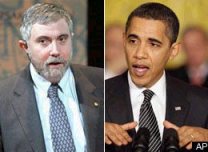I’ve repeatedly explained that Keynesian economics doesn’t work because any money the government spends must first be diverted from the productive sector of the economy, which means either higher taxes or more red ink.
So unless one actually thinks that politicians spend money with high levels of effectiveness and efficiency, this certainly suggests that growth will be stronger when the burden of government spending is modest (and if spending is concentrated on “public goods,” which do have a positive “rate of return” for the economy).
I’ve also complained (to the point of being a nuisance!) that there are too many government bureaucrats and they cost too much.
But I never would have thought that there were people at the IMF who would be publicly willing to express the same beliefs. Yet that’s exactly what two economist found in a new study.
Here are some key passages from the abstract.
We quantify the extent to which public-sector employment crowds out private-sector employment using specially assembled datasets for a large cross-section of developing and advanced countries… Regressions of either private-sector employment rates or unemployment rates on two measures of public-sector employment point to full crowding out. This means that high rates of public employment, which incur substantial fiscal costs, have a large negative impact on private employment rates and do not reduce overall unemployment rates.
So even an international bureaucracy now acknowledges that bureaucrats “incur substantial fiscal costs” and “have a large negative impact on private employment.”
 Well knock me over with a feather.
Well knock me over with a feather.
Next thing you know, one of these bureaucracies will tell us that government spending, in general, undermines prosperity. Hold on, the European Central Bank and World Bank already have produced such research. And the Organization for Economic Cooperation and Development has even explained how welfare spending hurts growth by reducing work incentives.
To be sure, these are the results of research by staff economists, which the political appointees at these bureaucracies routinely ignore.
Nonetheless, it’s good to know that there’s powerful evidence for smaller government, just in case we ever find some politicians who actually want to do the right thing.

